
Rede
USA-Reise: Rede des Verteidigungsministers an der Johns Hopkins University
Erster Abschnitt des Artikels„Starke transatlantische Partnerschaft erfordert starkes Europa“
Verteidigungsminister Boris Pistorius hat am 9. Mai an der School of Advanced International Studies (SAIS) der Johns Hopkins University in Washington eine Rede gehalten. Unter dem Titel „Steadfast, Capable, and Ready: Germany’s Security Renaissance and Transatlantic Defense” skizziert er die Zeitenwende und Deutschlands Beitrag im Bündnis.
Es gilt das gesprochene Wort!
Dean Steinberg,
Jeff Rathke,
Ladies and Gentlemen,
Thank you, Dean Steinberg, for this kind introduction.
It is an honour to speak at the Johns Hopkins University School of Advanced International Studies today. A school with an impressive history of academic excellence.
Time and again, history has been written at SAIS. Not just by the many famous speakers you have hosted over the years, but more than anything by the young minds you have educated and inspired to do great things out there. Considering your list of graduates in foreign and security affairs, I expect nothing less of you than achieving world peace after graduation.
Quite frankly: This school has been writing history by educating those who will shape the world – I can think of few tasks that are more meaningful.
I am grateful to Jeff Rathke and the American-German Institute, who continue to play a leading role on all issues related to Germany and the U.S.
Ladies and Gentlemen,
Yesterday, on May 8, I was at the tomb of the unknown soldier at Arlington National Cemetery. I laid down a wreath in memory of the end of World War II. On the date which officially marks the end of one of the darkest chapters in human history.
In three days, on May 12, I will attend a connected yet entirely different event: The ceremony to commemorate the end of the Soviet blockade of West Berlin. Commemorating and celebrating the incredible efforts of American and British pilots.
In June 1948, the first American and British DC-3 planes of the Berlin airlift touched down in the western parts of the city. A city that had been cut off by the Soviet Union from all crucial supplies.
Pessimism was widespread. People feared hunger. Many believed that a new war was unavoidable. And all that in a place that was still in ruins from a war which had ended only three years earlier.
Then, 76 years ago, the pilots of the Berlin airlift burst through these dark skies with their cargo of hope: food, coal, medical supplies, building material. With their deliveries they gave people hope at a time when despair was everywhere. And with this cargo they sent the message: We are there for you. Your security is our security. We will not let you down. All of this only three years after May 8, only three years after the end of World War II. I find this an incredibly strong symbol of transatlantic friendship.
Now, I am not here to sing the old transatlantic song of the candy bombers, the great symbol of good, traditional transatlanticism.
But it is worthwhile remembering today how much hope, how much optimism, and how much faith was brought to suffering people back then.
We Germans will always remember what you did for us during the time of the airlift. And we will always remember your efforts in the decades afterwards, when freedom had to be defended on NATONorth Atlantic Treaty Organization’s eastern flank – and when that flank was us, West Germany.
I remember growing up in my home town of Osnabrück in Lower Saxony, West Germany, in close neighbourhood with British soldiers and their families. On my way to school I would regularly see people in uniform, and I looked at them with youthful admiration. They were part of our communities, part of our daily lives. They became friends.
These NATONorth Atlantic Treaty Organization Allies were there to defend Germany from the Soviet threat. They were there to make our security their security.
The resolve shown by US pilots, British soldiers and many other allies and friends in 1948 and afterwards inspires transatlantic relations to this very day.
Ladies and Gentlemen,
I am visiting Washington as German defence minister at a time when the strategic landscape is denser and more challenging than it has been for decades.
According to an old saying, dealing with your country’s security means to always assume the worst. Thinking defence means thinking in worst case scenarios.
And it is indeed easy to surrender to pessimism given the truly enormous challenges we are facing almost everywhere today. But instead of surrendering you will rather see me with grim dedication fighting the crises and challenges ahead of us.
As we speak, Ukraine is fighting for its existence in a cruel war forced on it by a brutal, cynical Russian regime.
Putin’s illegal and inhumane war continues to bring unspeakable suffering to the Ukrainian people. This war is about much more than Russia and Ukraine. This war is about the question of whether we will allow an imperialist power to invade another sovereign state in Europe and annex territories in violation of international law, effectively taking away the freedom of its people.
Those who oppose democracy and freedom are looking very carefully at what is happening in Ukraine. And those who support democracy must support Ukraine’s fight for freedom.
We have to show Putin that he will not get away with this. We have to show him that the strength of the law is mightier than the law of the strongest. I believe Russia's war in Ukraine is Europe’s most decisive challenge today. It is the most immediate and most urgent threat to the international order. Russia is, and for the foreseeable future will continue to be, the greatest threat to our common security.
That is why Germany is one of the strongest supporters when it comes to helping Ukraine to restore its territorial integrity. It is our responsibility to strengthen its resilience. And it is in our power to support Ukraine in fighting and winning this war.
Today, Germany is the second largest contributor of military, financial and economic aid to Ukraine.
Russia’s historic breach of international law and their attack on the decade-long peace in Europe have led Germany to abandon long-held political reservations, especially regarding the supply of arms to war zones. If you will we are witnessing a complete change in zeitgeist.
Today, German main battle tanks, infantry fighting vehicles, howitzers, air defence systems and many more systems are used by Ukrainian soldiers to fight the Russian aggressor. We are delivering one quarter of our own PatriotPhased Array Tracking Radar to Intercept on Target systems to our Ukrainian friends. And we will not stop here.
The German Foreign Minister and I have launched the Immediate Action on Air Defence initiative to boost air defence pledges. Together with our French and Polish partners we lead the Capability Coalition on Integrated Air and Missile Defence and we are constantly looking for ways to speed up the production and supply of ammunition.
This year alone, we plan to spend more than seven billion euros on military assistance to Ukraine.
We all know, helping Ukraine is a joint effort. That is why I am very pleased about and deeply grateful for the recent decision of Congress to pass the U.S. assistance package to Ukraine. This decision will save thousands of Ukrainian lives, while Russia remains resolved to win this cruel and bloody war. The military, but also the psychological dimension of this bill cannot be overestimated. Together, we will prove that Russia cannot outlast us. That we are steadfast and strong and that our support will not falter!
Our support includes the training of Ukrainian military personnel in Germany: Only last year, about 10,000 servicemen and servicewomen underwent training in Germany. We owe this partly to our EUEuropäische Union partners who sent additional military training staff to Germany.
Germany is not just providing military support to Ukraine, we have also taken in the largest number of Ukrainian refugees in the European Union.
With the start of Putin’s full-scale invasion, German train stations became a hub for people fleeing the war zone in Ukraine. Many refugees were welcomed into private homes and more than half of the German population took action to help Ukrainian refugees.
And Germany is also engaged in rebuilding Ukraine’s destroyed cities and villages. Next month, Germany will host the Ukraine Recovery Conference in Berlin. I strongly believe that these efforts will have great impact on boosting the morale of Ukrainians in their fight for survival.
Ladies and Gentlemen,
Behind the terrible challenges we are facing in Ukraine today lies the strategic and fundamental question of European security.
Keeping Europe united, free and at peace has been an American strategic objective ever since those first DC-3 planes landed in Berlin.
At the same time, we are aware that America's resources and attention cannot and will not be centred on Europe in the future. That is why we are working hard to make Europe’s contribution to transatlantic burden-sharing more relevant and why we have taken on more responsibility for the security of our continent.
In the past years, we Germans had to face a new reality. A reality in which we have free and democratic Europe on one side, and authoritarian and aggressive Russia on the other.
Only last year, we published our very first National Security Strategy, which sets out German security interests and can be seen as a milestone on our journey towards coming of age in terms of security.
As I stand here in one of the most prestigious universities in the United States, my message to you is: We understand what is at stake. We cannot simply watch and wait as international law, our order and our values are being destroyed.
Together, we need to step in for the rules-based international order. And we cannot afford to fail, as there is too much at stake. This applies worldwide and especially to hotspots in Africa, the Middle East and the Indo-Pacific. And that applies in Ukraine.
We are doing our fair share. Germany is making national and collective defence its priority - while at the same time reshaping its engagement in other parts of the world. Our Zeitenwende, this well-worn expression, is real. And it is making a difference.
What does the Zeitenwende entail?
First: We are paying our share. This year, Germany will spend more on defence than ever before in the history of the Bundeswehr. We have launched significant new investments in military equipment and will increase our national defence spending to more than two percent of our GDP this year. And we will not stop there.
I am working hard to ensure that our spending and our investments will continue to rise. Two percent are our floor, not our ceiling. We have understood: The times of the peace dividend are over.
We are spending money on vital assets and capabilities, for example to procure tanks, frigates, submarines, ammunition, deep-fire capabilities, F-35 fighter aircraft and CH-47F helicopters, and to strengthen the much-needed air defence. We have opened new production lines in Germany and are buying additional defence equipment, arms and ammunition in Europe as well as the U.S. With U.S. defence companies alone, we currently have around 380 contracts, with a total value of around 23 billion US dollars.
Second: We are working very hard to prepare the Bundeswehr for today’s challenges. That includes restructuring our armed forces, as well as rethinking and improving the recruitment and retention process for our armed personnel.
As many of you will know, Germany like many other countries suspended conscription after the end of the Cold War. But times have changed. I am convinced that Germany needs some kind of military conscription. We need to ensure our military staying power in a state of national or collective defence.
And third: We are committed to the security of our partners. We know: Collective security is what makes us strong. The security of our Allies is our security. Therefore, by next year, a majority of Bundeswehr troops will have been placed under NATONorth Atlantic Treaty Organization command. And approximately 35,000 of those will be at the two highest readiness levels. Our special focus remains on defending our Allies at NATONorth Atlantic Treaty Organization’s eastern flank.
From the High North to the Balkans, from the Baltic Sea to the Mediterranean: We are dedicating substantial assets to the security of our Allies and of NATONorth Atlantic Treaty Organization as a whole.
Across the eastern flank, we are ramping up the presence of the Bundeswehr: most prominently by deploying a robust, combat-ready permanent brigade in Lithuania. Together with our Allies we are sending a strong message to Putin: If any Russian soldier puts their boots on Allied territory, we will defend every inch of it.
I mentioned earlier that as a frontline state during the Cold War, Germany benefitted greatly from the Allied presence in our country. The decision to permanently deploy a brigade to Lithuania is a big step for us and a lighthouse project of the Zeitenwende: A strong message that for us, national defence is collective defence. The security of our Allies is our security. Your freedom is our freedom. And we stand ready to jointly defend both.
Only four weeks ago I saw off our forward command element at Berlin airport. In the coming months and next year, we will deploy more servicemen and servicewomen to Lithuania while our Lithuanian friends will provide the necessary infrastructure. All of this is happening in close coordination with our Allies and in line with NATONorth Atlantic Treaty Organization’s defence plans.
Ladies and Gentlemen,
All of us in free Europe are grateful for the security umbrella the United States has offered over the past seventy-five years. Both sides of the Atlantic have benefitted from this close partnership. Together we are showing the world and all revisionist powers that we stand together whenever our values and legitimate interests are threatened. In being a strong member within NATONorth Atlantic Treaty Organization, the U.S. gathers a reliable circle of allies around itself.
NATONorth Atlantic Treaty Organization remains central to our security and we do not take it for granted.
Given our geographic location in the heart of Europe and also because of our history, it is part of Germany's DNA to respond to security issues in close cooperation with its allies and partners. Our geopolitical relevance comes from our integration and cooperation with neighbours, partners and allies.
We see our bilateral and multilateral cooperation formats as a way to boost cooperation within Europe, because a strong transatlantic partnership requires a strong Europe. The formula is very simple: a stronger Europe for a stronger NATONorth Atlantic Treaty Organization. We are therefore working hard to strengthen the European pillar within NATONorth Atlantic Treaty Organization and we are willing to take the lead.
We Europeans need to translate our common responsibility into common strength – by means of more integrated defence efforts, improved military mobility, logistics and infrastructure and more cooperative defence procurement and development. With this in mind, Chancellor Scholz launched the European Sky Shield Initiative almost two years ago. Together with Norway we are building identical submarines, together with France we will develop next generation air and ground combat systems. Our focus is on cutting-edge technology as well as on interoperability and interchangeability.
And we are working hard to boost the defence-industrial complex. Together with our partners in the defence industry, we are drastically stepping up production capacities for urgently needed equipment, arms and ammunition. New production lines have been opened, for example for producing Gepard air defence ammunition, air defence equipment or 155 mm ammunition. We are fully convinced that our approach of acting with partners is what makes us stronger.
I am convinced that not only we Europeans need NATONorth Atlantic Treaty Organization. The United States needs the Alliance as well. Because NATONorth Atlantic Treaty Organization is much more than a military Alliance whose job it is to respond to military attacks on Alliance territory. It is a strong political bond between North America and Europe with the purpose of dealing comprehensively with security challenges from all across the globe - from nuclear proliferation to international terrorism, from cyberattacks to underwater threats, from tensions on the Korean peninsula to escalation in the Middle East.
I am therefore very much looking forward to the upcoming NATONorth Atlantic Treaty Organization summit here in Washington. We will not only celebrate 75 years of transatlantic Alliance, which has grown and become stronger over the years. We will also demonstrate our greatest strength: our unity and our ability to adapt to new geopolitical realities. The summit will demonstrate that at the age of 75, the Alliance remains the credible backbone of our collective defence and remains capable of meeting today’s challenges.
Ladies and Gentlemen,
I have spent a lot of time talking about the threat Russia is posing to the international order. However, this does not in any sense mean that we Europeans are closing our eyes to other challenges in the world.
We are well aware of the long-term challenges that China poses to the existing rules-based international order. And we are well aware of the close ties between Russia and China, which go way beyond political and economic cooperation.
In the Indo-Pacific, we see Chinese ambitions grow, just as fear is growing over Beijing’s military build-up, its aggressive economic policies and its open quest for geopolitical dominance.
We Europeans are well aware that America's resources and attention will increasingly move towards the Indo-Pacific.
Germany is committed to making its contribution to the rules-based international order in the Indo-Pacific - by enhancing our cooperation with valued partners in the region, by upgrading our participation in military exercises, but also by contributing to the maritime enforcement of UNUnited Nations sanctions against North Korea. To this end, in 2021 the Federal Government started its annual Indo-Pacific Deployments. This year, we will deploy a frigate, a supply ship and an air force detachment to the region.
Just before boarding the airplane to New York City two days ago, I saw off the crew of our supply ship on its journey to the Indo-Pacific. I am deeply impressed by their level of dedication and responsibility for their endeavor.
Ladies and Gentlemen,
The challenges we are confronted with are numerous. We are witnessing geopolitical competition around the world: autocratic leaders are trying to challenge the democratic system at the heart of the transatlantic partnership. Climate change, poverty and corruption are threatening lives and fuelling conflicts. So are terrorism and religious extremism.
Seven months after the terrible attack by Hamas on Israel I am still shocked by the brutality and inhumanity committed against so many innocent children, men and women. The suffering on all sides is hard to bear. Shortly after the attack, I paid a visit to my colleague and friend Yoav Gallant to underline: Germany stands by Israel.
Now, seven months later, the risk of the conflict widening to other parts of the region remains. Indeed, the possibility of escalation is extremely high, with potential implications for the entire world. This is particularly the case given a potentially nuclear Iran.
The response to all of these challenges can only be a common one. None of us can succeed alone – we must work together to uphold the principles of our international order. Germany is committed to doing so.
That is That is why earlier this year, Germany sent a frigate to participate in the EUEuropäische Union-led mission ASPIDES in the Red Sea. We will help protect maritime traffic in a region that is under attack by Houthi rebels from Yemen - together with our European partners and in close coordination with the US-lead Operation Prosperity Guardian.
Another region that has been and continues to be vital to German interests is the Sahel. It is not only a region crucial for the stability of West Africa, but it also faces major challenges ranging from poverty and hunger to terrorism, failing states and international power competition.
Both Russia and China increased their influence in recent years. Russia is highly ambitious. It is exploiting the ongoing political and security crises and as a result destabilising the already volatile security environment, while spreading discord between the Sahel and the West. Meanwhile, China is becoming more active in promoting its economic interests in the region, creating economic dependencies that will cost the countries dearly in the future. Also, China will exploit these to push through its political interests and views, as several examples around the world show.
Germany has a vital interest in the region’s stability and prosperity. Our objective is to prevent destabilising players from gaining a foothold there. We want people to be able to live in safety and dignity so that they have no reason to leave their homes and set out for Europe.
We also understand that the people in the Sahel want self-determination, in matters big and small. They do not want to be told what rules and principles they should follow in governing or managing their country. They are worried about maintaining their national sovereignty, not least as a result of their collective experience under colonial rule. This is the impression I took home from two trips to the Sahel where I met not only with representatives of the ruling juntas but also with representatives of civil society.
That is why we are committed to African ownership and that is why we encourage African solutions to African problems. We stand ready to assist the countries that want peace and stability. That welcome our support in building their capacities both with equipment and military expertise. We see this as a contribution to stability in a fragile environment - again, in close coordination with our partners and Allies.
Whether in Africa, the Middle East or in Europe, our international order is under attack. Established and emerging powers are competing with the West, questioning the value and relevance of freedom and democracy. This means: Whether in Africa, the Middle East or in Europe, Germany and the United States of America are natural and indispensable partners. We will only be able to defend our common interests and values and our common international order together, and in concert.
Ladies and Gentlemen,
When Paul Nitze and Christian Herter founded SAIS in 1943, two years before the end of World War II, the international order was in ruins. The founders of SAIS intended to prepare the next generation of leaders for meeting the complex challenges the U.S. and the world would face following the war.
Since 1943, this university has produced many generations of thinkers and doers. This institution has played a leading role in building a new global order.
Today, we find ourselves at another turning point in history. Your President called it an inflection point where one era is ending and a new era is beginning. In Germany, we call it Zeitenwende.
I am convinced that only together, America and Europe can keep the West strong, defending it against Russia’s expansionist ambitions and other actors’ hunger for power and supremacy. My message to you today is: Just like we did in other key moments in our transatlantic partnership such as the Berlin airlift, the Marshall Plan or the reunification of Germany, let us seize this transatlantic opportunity once more.
I stand here to reassure you: Germany is a steadfast Ally. Germany is capable and it is ready to play its part within the Alliance and in global politics. Let us – the US and Germany together - shape a future with all those who stand up for freedom, peace and the rules-based international order.
Thank you.
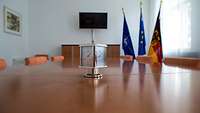
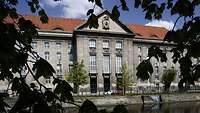
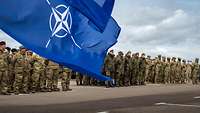
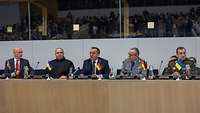
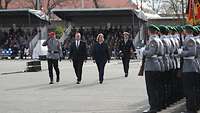


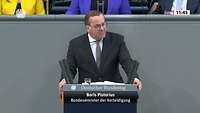
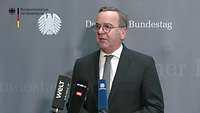

Inhalte teilen via